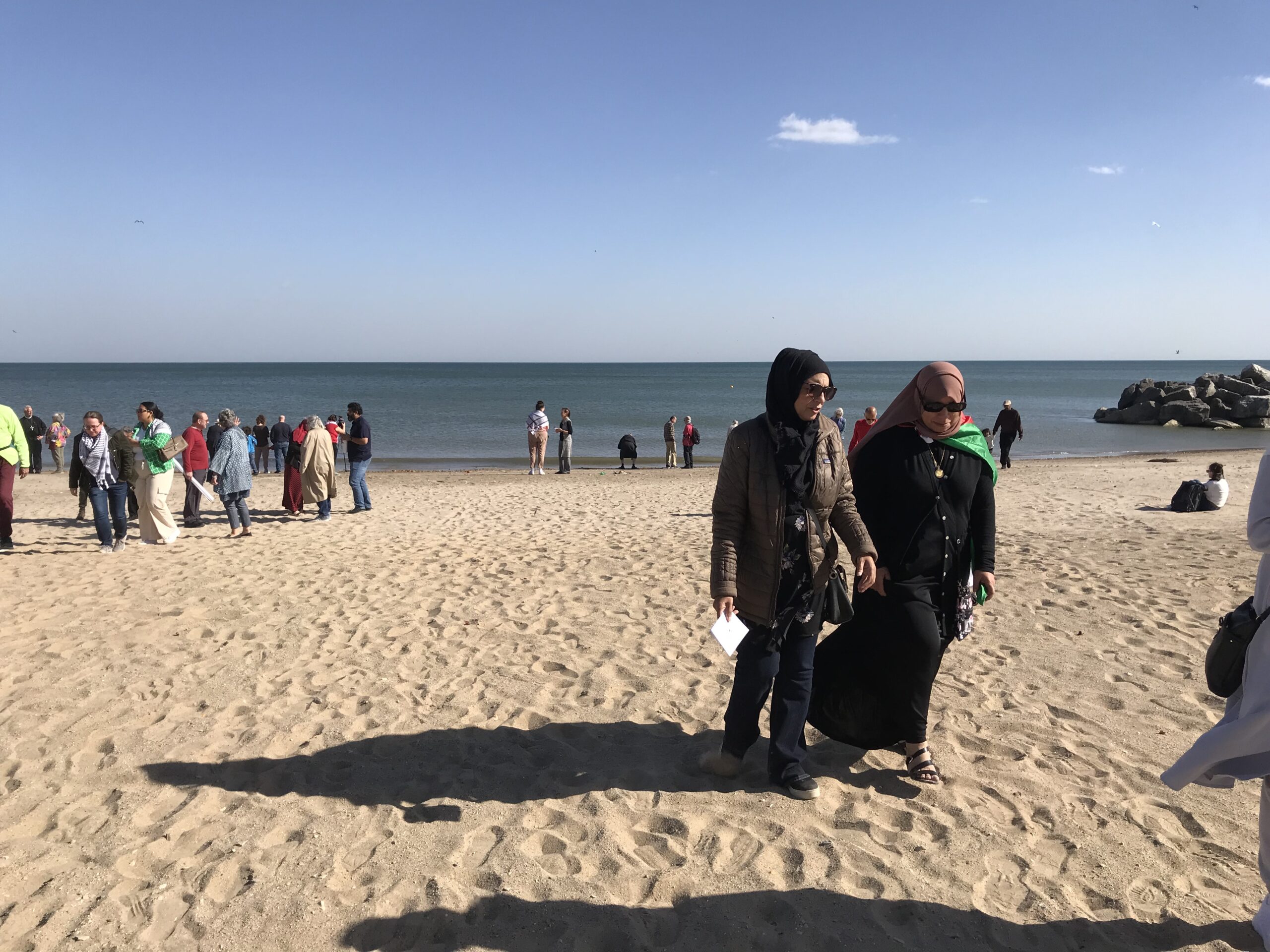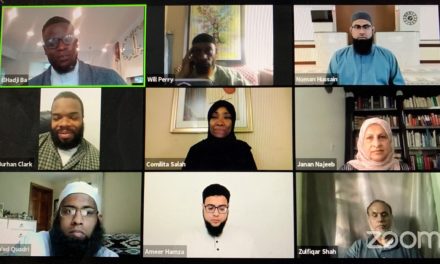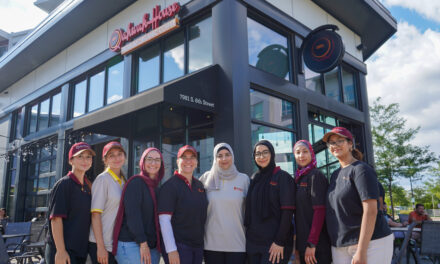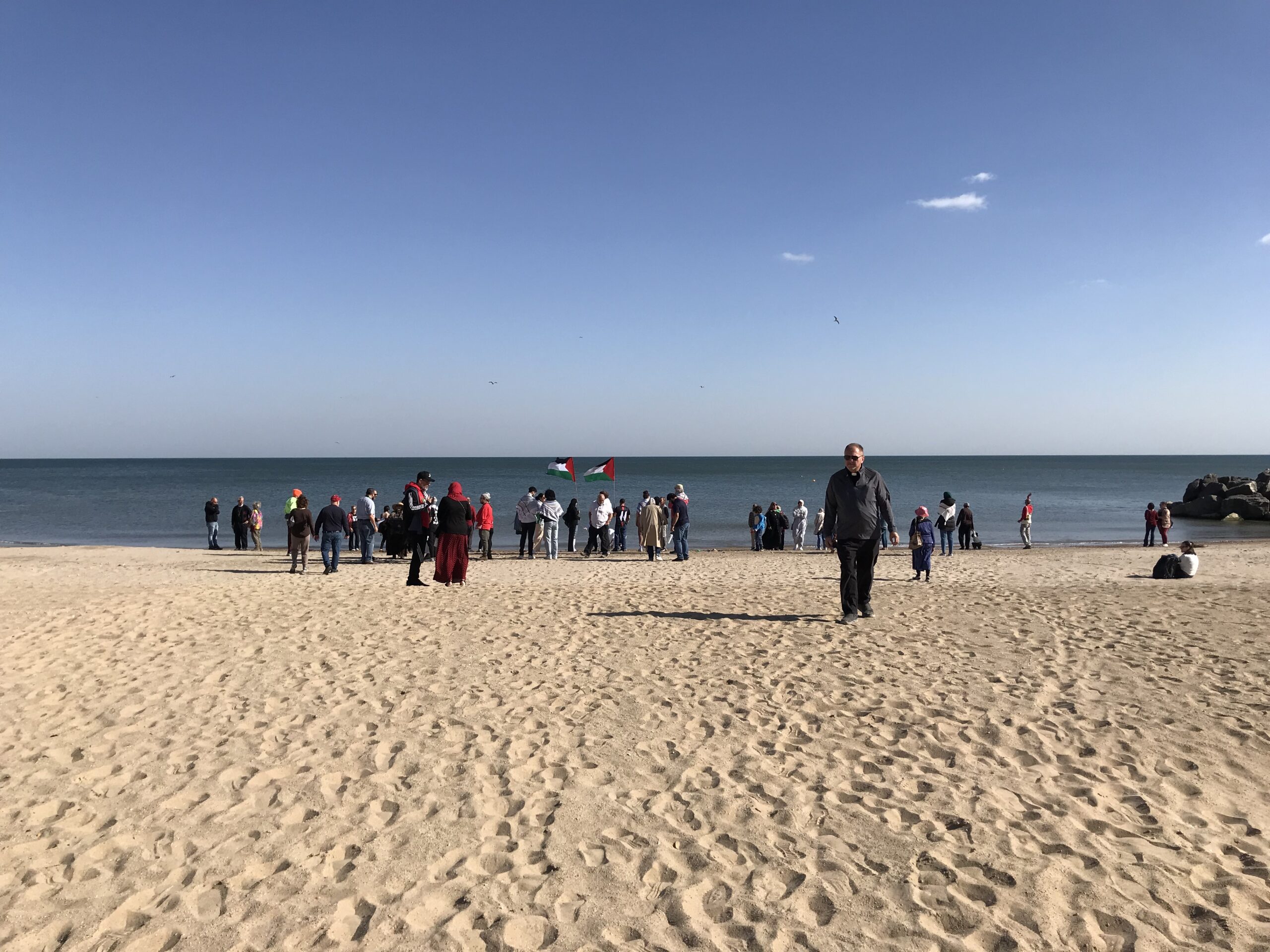
Photo by Cherrie Hanson
Jewish Voice for Peace-Milwaukee and Chavurat Tziporah held an interfaith tashlich Oct. 6 on the shore of Lake Michigan recently to symbolically cast off the sin of not doing more to prevent Israel’s genocide of Palestinians and to renew their commitment to work for an arms embargo.
On a clear Sunday afternoon in early October, a small band of people gathered at the shore of Lake Michigan in Milwaukee as a brisk wind blew. Several wore religious accoutrements—clerical collars and crucifixes, hijabs and robes. Members of Jewish Voice for Peace dressed in black. Their t-shirts proclaimed in large white letters, “NOT IN OUR NAME.”
As JVP’s Shā Harvey strummed her guitar and led the group in singing, “We Rise,” others joined—families with young children, older adults—several recognizable from their decades of civil rights work—and many young adults. Soon about 70 people sang along. A young girl waved a big Palestinian flag. A few passersby driving on Lake Drive honked in support.
In the midst of Jewish High Holy Days, Jewish Voice for Peace-Milwaukee and Chavurat Tziporah held an interfaith tashlich Sunday, Oct. 6, at McKinley Beach. A tashlich is a ceremony in which one throws bread crumbs (or, in this case, sand or pebbles) into a body of water, symbolizing the casting off of one’s sins. The organizations united in their common commitment to justice and the shared opinion that support of the modern state of Israel is not part of their faith.
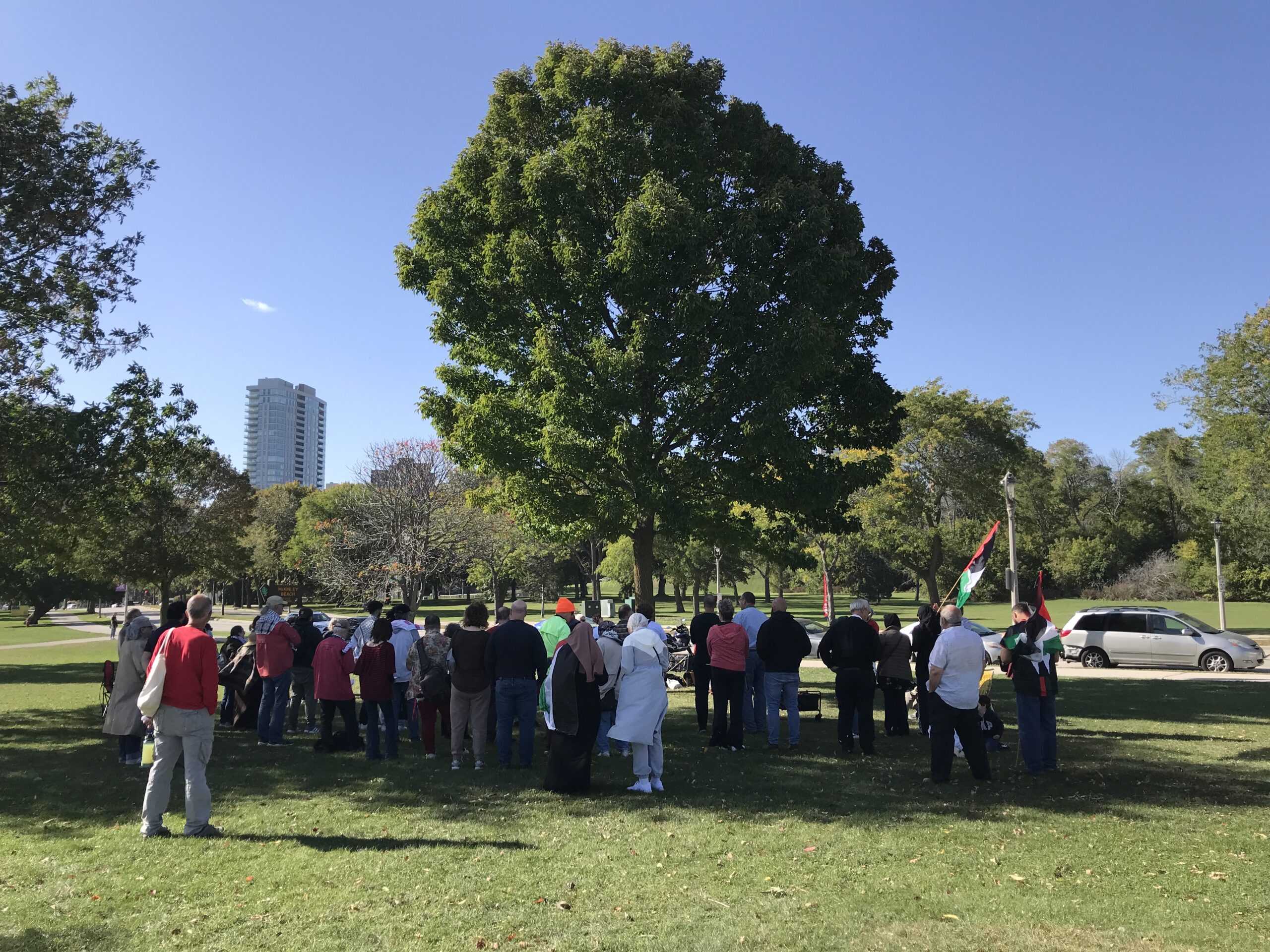
Photo by Cherrie Hanson
A small, interfaith group gathered initially to observe the Jewish ritual of tashlich to recognize communal sin in not preventing a genocide in Gaza. Through the afternoon, the group grew to about 70 people.
Jewish High Holy Days of 2024 began at sunset on Oct. 2 with Rosh Hashanah, marking the New Year, a time of renewal, and ended at sunset Friday, Oct. 11, with Yom Kippur, the Day of Atonement. The 10 days in between were a time to reflect on the past year, repent sins and invite changes for the future.
This year’s holidays, coming near the anniversary of the Hamas surprise attack in Israel and the beginning of Israel’s War in Gaza, which has continued, escalated and now includes Israel’s incursion into Lebanon, feels different, said JVP member, Professor Jodi Melamed. “As we also grieve Jewish Israelis killed and taken hostage on 10/7, we grieve the tens of thousands of Palestinians who have been killed, who have been tortured, imprisoned, kidnapped and starved this year. We want to interrupt the Jewish voice that again says only Jewish lives matter.”
As a JVP flier announcing the event explained, “In continued response to the horrors in Gaza,” the two organizations called for the gathering “for a ritual action to acknowledge our collective responsibilities and call for an arms embargo now!”
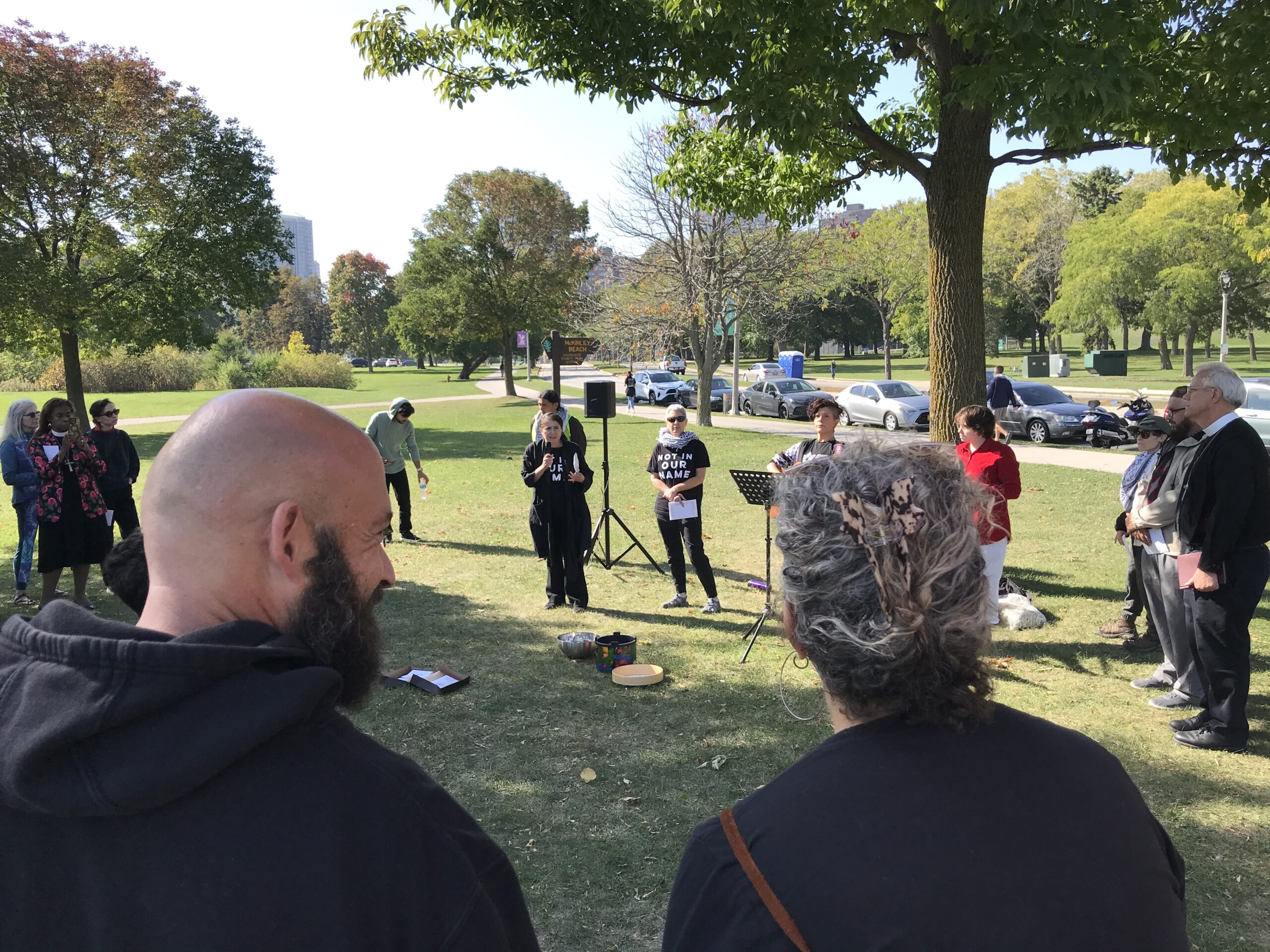
Photo by Cherrie Hanson
Religious leaders and activists spoke about communal responsibility for the suffering caused by the Israeli military’s attacks on Palestinian and Lebanese civilians in the past year.
Why they gathered
A few days before the ceremony, Sam, the administrator for Jewish ritual and learning at Chavurat Tziporah, explained its significance to the Wisconsin Muslim Journal. “The ritual of tashlich has continued specifically among traditional orthodox communities for centuries,” they said. “In the past decade or so, progressive Jewish communities have started the practice during the High Holy Day period. It usually has some themes of communal responsibility, like this one, with a focus on what’s going on in Gaza, Palestine and beyond.
“The way it’s being used here is not so much that we can cast away the sins of Zionism, the political project, and the state of Israel, but we are acknowledging communal responsibility. We are signaling that our community is casting off Zionism and calling for an arms embargo, calling for a ceasefire. “
While they had heard of other JVP chapters around the country holding a tashlich for a similar purpose, they are not aware of any other Jewish organization or congregation in the Greater Milwaukee area doing so.
Melamed told WMJ in an interview a few days before the ceremony, “What we really need is to focus on is the way the pro-genocide forces have manufactured the illusion of a monolithic Jewish community to support their violence and that we have felt sometimes frozen in the face of that manipulation.
“We want to acknowledge not having done enough to commit ourselves to challenge the violence and harm that the Milwaukee Jewish Federation has done to our local Palestinian and pro-Palestinian community by weaponizing antisemitism to smear and attack our siblings, friends, colleagues and comrades, for all the ways that many people have used antisemitism to justify racism and violence.”
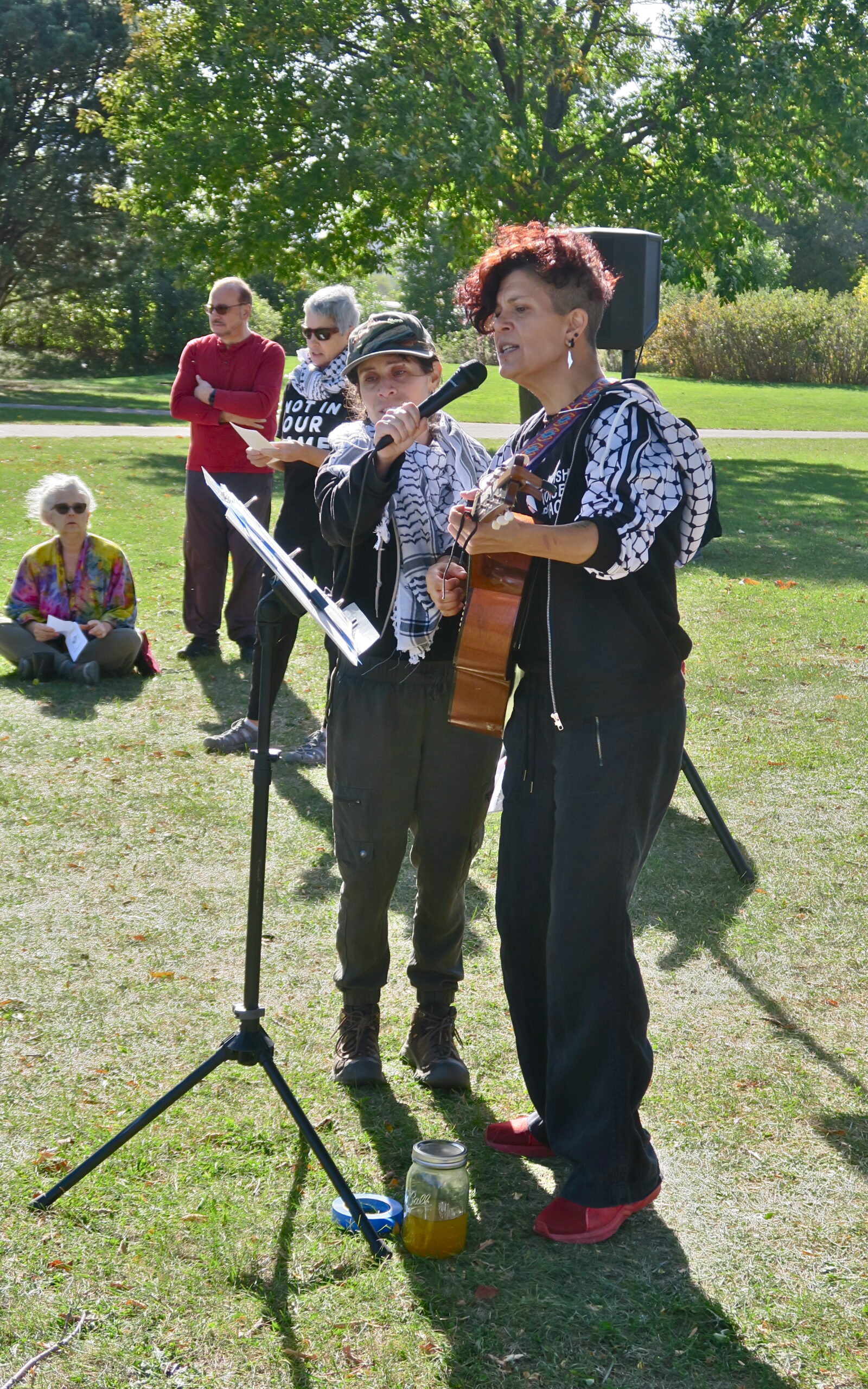
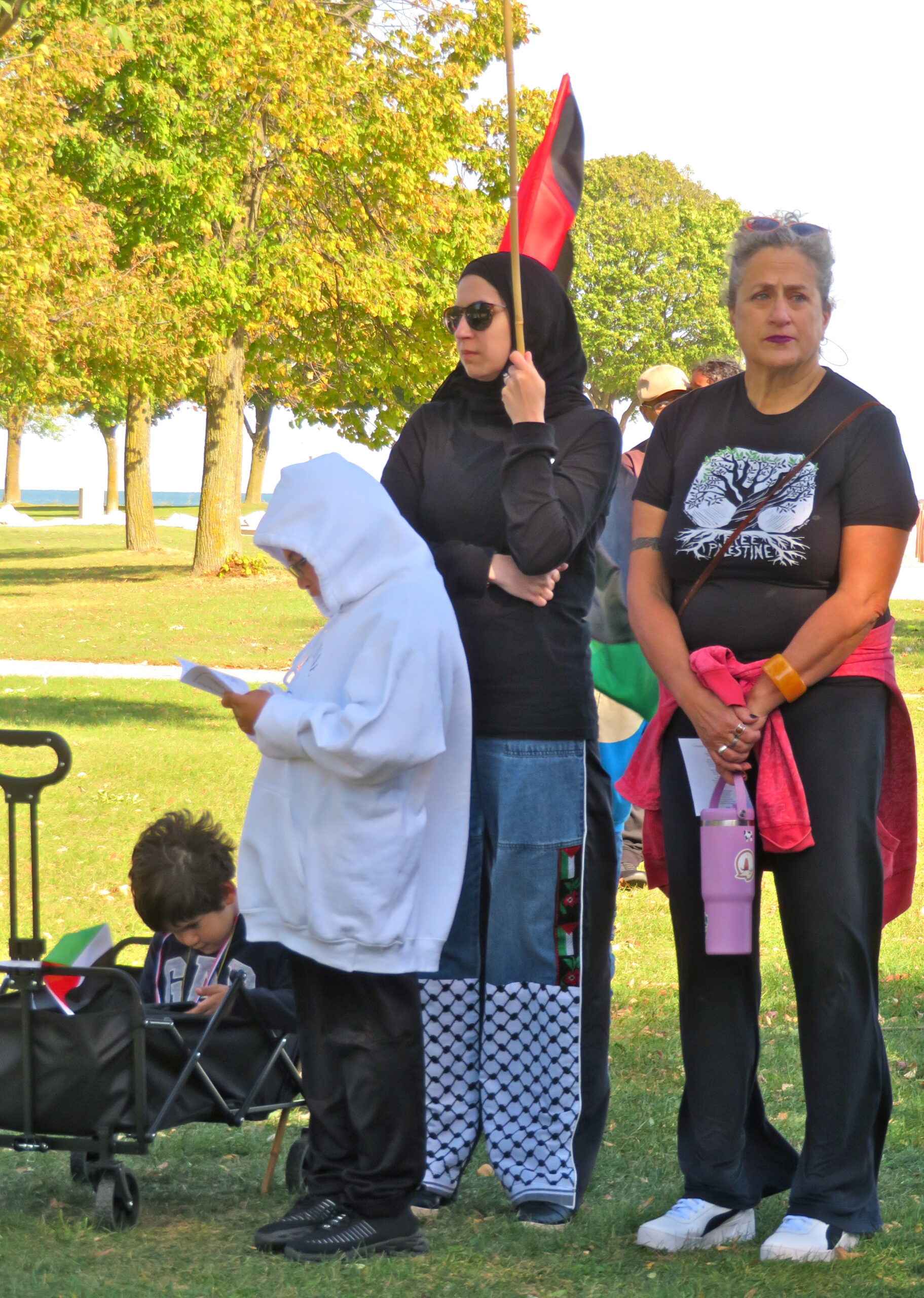
Photos by Susan Bietila
Jewish Voice for Peace member Shā Harvey (left) leads the crowd in singing in Arabic, English and Yiddish.
On the shores of Lake Michigan
As the first song drew to a close, Melamed read a prepared statement: “As a chapter of Jewish Voice for Peace, we organize direct actions, campaigns and Jewish rituals to end Israeli apartheid and reclaim a Judaism that reaches far beyond Zionism.
“For generations, Jews have gathered to practice the ritual of tashlich, which offers us the chance to recognize, feel in our bodies and release the ways in which we have missed the mark this year, both personally and collectively. With this ritual action, we take our place in a long lineage of Jews dedicated to justice.
“But this year is different. Today is 10/6/24: We grieve 76 years of Palestinian death and dispossession by the Israeli regime. We grieve the tens of thousands of Palestinians killed, tortured, displaced, kidnapped and starved this year.
“The clock didn’t start on 10/7; 10/6/23 was already a crisis for Palestinians under decades of occupation, siege, apartheid and dispossession,” she said.
“We strengthen our spiritual work when we pair it with rigorous demands for justice. Today our demand is clear: The U.S. must divest from death. The only way to achieve a ceasefire is to stop arming and funding the Israeli genocide. Arms embargo now!”
“Arms embargo now! Arms embargo now!” those gathered chanted.
Harvey strummed and led singing in English, Arabic and Yiddish, “the language of my ancestors in the shtetel, a language of the oppressed,” she said.
Video by Cherrie Hanson
In a Jewish ritual tashlich, participants carried a handful of sand or pebbles to throw in Lake Michigan. (Click on image to watch video)
An interfaith event
Interfaith speakers included Iman Muhammad Shafique of Masjid Al-Qur’an in Milwaukee and Bishop Paul D. Erickson of Greater Milwaukee Synod of Evangelical Lutheran Church in America (ELCA).
Also participating in the ritual was Rev. Joseph Ellwanger, a founding member of MICAH (Milwaukee Inner-City Congregations Allied for Hope) and a retired pastor of the Evangelical Lutheran Church in America.
“In Islam, the sanctity of life is paramount,” Imam Shafique explained. “Taking one innocent life is equal to killing all humanity and saving one life is akin to saving all humanity.
“The injustices faced by the Palestinians—occupation, displacement and violence—are violations of the sacred right of life … Islam teaches us to uphold justice, even if it is against yourself or your family or your community … Justice is not selective. It is not confined to Muslims alone. It is a universal right of all humanity. The Palestinian struggle is a human rights issue. It is our duty to stand with the oppressed.”
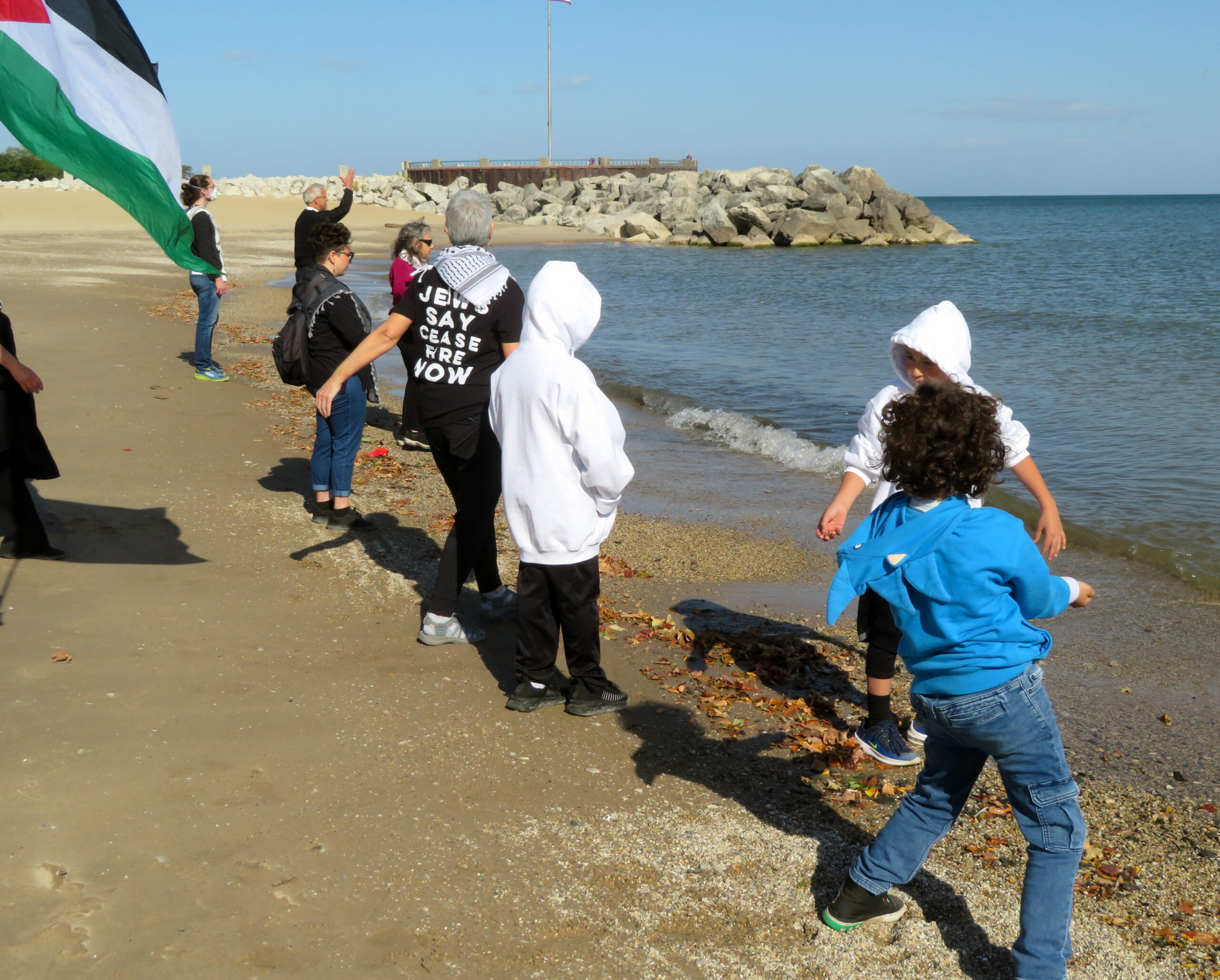
Photo by Susan Bietila
Bishop Erickson led the group in a call-response in which he prayed and the group responded, “How long, oh Lord?”
“We are crying out for justice, yearning for what is right, longing for your peace,” he began. “Come quickly to help us, oh God, save those who call upon your name and your people cry,”
“How long, oh Lord?”
“We hear of hateful violence and senseless killing, and your people cry,”
“How long, oh Lord?”
“We feel the suffering, sorrow, and shame of the oppressed. And your people cry. We fear that justice will continue to be delayed or denied. And your people cry. We recognize patterns of privilege and political expediency and systems of discrimination. And your people cry.
“How long, oh Lord?”
Video by Cherrie Hanson
A number of Palestinians participated in the Jewish ritual. As Americans, we should do more to stop U.S. weapons from going to Israel, one said. (Click on image to watch video)
Casting off sin
The Jewish leaders of the ceremony instructed the group to pick up rocks and sand, carry them down to the waterfront and toss them into gentle waves breaking on the shore. With them, they were told to cast off the sins and the harm of the past year—“and our grief”—into the water.
As the program explained, “As people living in the United States—a country that continues to arm, fund and carry water for the Israeli military and government, including one year into Israel’s genocide of Palestinians and now the attacks on Lebanon—there is perhaps no more important ‘casting off’ than of our individual and collective complicity in providing many of the weapons being used to massacre and displace Palestinian families … We take responsibility for not having built enough collective power to make our government stop funding and arming this horrific violence. We commit to organize more powerfully for an arms embargo, knowing the U.S. could stop this genocide today.”
